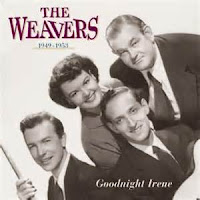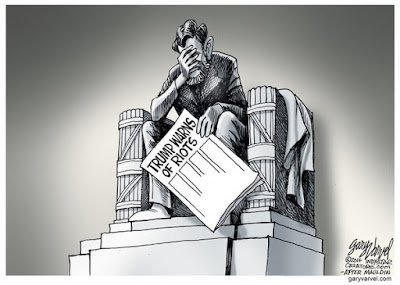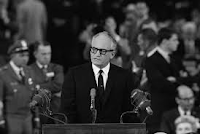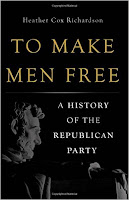 |
| Dr. Lenny |
I'm not a comedian and I'm not sick.
The world is sick and I'm the doctor.
I'm a surgeon with a scalpel for false values.
I don't have an act. I just talk.
I'm just Lenny Bruce.
 |
| Unpublished cabaret card ID |
It's impossible to believe: Lenny Bruce died fifty years ago tomorrow. It's even harder to consider that he's been gone from this earth ten years longer than he walked it. His was a life too short. He was only two-months and ten days shy of his forty-first birthday when, alone and in despair, his career as an entertainer in ruins, he stepped into eternity.
Think about it: If someone as young as Lenny was on August 3, 1966 had died today, that person would have been born one month after Pink Floyd released their Wish You Were Here album. Damn! That's not a very long life at all! That's way too young, Jim.
The memory is as clear as if it was yesterday: Sitting in the back seat of my father's station wagon, heading for New York City in the late summer of 1972, I noticed a paperback book on the floor with what had to be the most peculiar title I had ever seen in all of my fourteen years: "How To Talk Dirty and Influence People" by some guy named Lenny Bruce. As it turns out, the book had been accidentally left in the vehicle by a local hitchhiker who Dad had picked up. He was always picking up hitchhikers, a trait he passed along to me. The owner had even printed his name on the front page of the book; I can still remember it: "Terry Malone".
 Examining the photographs and reading bits and pieces of the text, I got the understanding that the subject of this autobiography was a comedian, and that he had been in trouble with the law due to the nature of his material. I wondered to myself, Why would anyone arrest a comedian for doing his act? I could also see from the epilogue at the book's conclusion, written by his friend Dick Schaap, that the author had since passed away. By this time Lenny had only been gone for six years. "Dad?", I called out to my father at the wheel, "Who was Lenny Bruce?" I'll never forget his answer as long as I live. With a sad lilt to his voice, he replied: "Oh, he was some mixed-up comedian."
Examining the photographs and reading bits and pieces of the text, I got the understanding that the subject of this autobiography was a comedian, and that he had been in trouble with the law due to the nature of his material. I wondered to myself, Why would anyone arrest a comedian for doing his act? I could also see from the epilogue at the book's conclusion, written by his friend Dick Schaap, that the author had since passed away. By this time Lenny had only been gone for six years. "Dad?", I called out to my father at the wheel, "Who was Lenny Bruce?" I'll never forget his answer as long as I live. With a sad lilt to his voice, he replied: "Oh, he was some mixed-up comedian."
Hmm, I thought to my self, Dad doesn't approve??? This is something that must be looked into! Since he was always referring to me as "a mixed-up kid", maybe this Lenny Bruce character was a kindred spirit. As it turns out, he was, but for entirely different reasons.
I put the book out of my mind and went on with my life. Not long afterwards - it might have been about a month - I was watching the Ten O'Clock News on Channel 5 (this being back in the day when it was the best local news program in New York) when, low and behold, there was the movie reviewer, Stuart Klein, giving his critique on a new documentary called, Lenny Bruce Without Tears.
 |
| Lenny's second LP (1958) |
Klein's review contained archival film of Lenny doing his act and, so help me, the man was a screaming riot! A few days later I was at the Book And Record store at the long-gone Orange Plaza Mall in Middletown with a few bucks to spend. I headed straight for the comedy section to see if they might have any LPs in stock of this Lenny Bruce guy (I was a comedy nerd even at that early stage). Not only was he in stock, I was pleasantly surprised to discover that they had an entire LENNY BRUCE section! The old adage tells us never to judge a book by its cover; that's not true when it comes to comedy records. The one I chose was called "The Sick Humor of Lenny Bruce" with a morbidly hysterical photo on the cover of Lenny enjoying a pleasant picnic - in a grave yard!
Later that night, my father stopped by the house to check on things (my parents were separated). When he noticed the Sick Humor LP sitting next to the stereo, he put his foot down. "Oh, no you don't!", he told me, "I don't want any dirty comedians performing in my house!"
"But Dad", I said to him, "He's not dirty. HE'S FUNNY! I'll prove it to you right now! Just listen!"
I then proceeded to play for him the "Non-Skeddo Airlines" bit, the one about a guy who blows up an airplane ("with forty people and his mother"). I'll never forget the sight: Dad roared with laughter. Other than the time ten years later, when I played him a videocassette of Fawlty Towers, I never saw him laugh so hard or so loud in all the years I knew him.
Here's where the story gets interesting: Several months later, in around May of 1973 at Saint John's School, the nun who presided over my eighth grade class, Sister Elina, informed her charges that, for our final book report of the year, we had to do an autobiography.
"Any autobiography?" I asked, trying to look as innocent as possible.
"Yes, Mr. Degan", she responded in as condescending a tone as she could muster, "any autobiography."
"Hmm", I said. Let it be noted here for the record that I said "Hmm" an awful lot in those days. I was that kind of a kid.
I guess I don't need to tell you what direction the story goes from here. Sister Elina was a woman legendary for lacking anything even remotely resembling a sense-of-humor. Apparently "How To Talk Dirty and Influence People" was not quite the subject matter that the old gal had in mind. The book, along with the "Sick Humor" record (which I had brought along as an audio reference), were tossed into the school's incinerator. Not only was I suspended for several days (a first for that school) I was banned from participating in the graduation ceremonies the following month. That was fine by me. I wasn't quite jumping for joy at the prospect of donning one of those silly caps and gowns. To this day, I am convinced that Sister Ann Daly (who taught the sixth grade) would have gotten the joke.

In the autumn of '73, after a disastrous two-month stint at a Catholic boarding school (St. Francis Prep in Spring Grove, PA) my mother took me to be enrolled at John S. Burke Catholic High School in Goshen - where I was promptly refused admission. The principal, a very nice lady named Sister Margaret Phillips, referred to "the Lenny Bruce incident" as grounds for that refusal. I just couldn't be expected to integrate properly into the hollowed and holy grounds of their beloved Burke High, a school which wasn't named after a saint, by the way, but for the president of B. Altman's department store. How's that for hypocrisy?
"He's a troublemaker", she told my mom in my presence.
So, now you know: The blog you are reading is not my introduction to controversy. I spent the rest of my high school years (or what were left of them - I dropped out in 1975) attending public school, the only member of my family (cousins included) to do so. For good or ill, I have Lenny Bruce to thank for that. The guy had an impact on my life, no doubt about it.
Maybe he had some problems
Maybe some things that he couldn't work out
But he sure was funny and he sure told the truth
And he knew what he was talkin' about
He's on some other shore
He didn't want to live anymore
Bob Dylan
It bugs me when people, to this day, (serious writers even) refer to Lenny Bruce as "a dirty comedian". He wasn't that at all. In fact, it is my belief that Lenny was the closest thing American humor has ever produced to being a free-form poet. That he was profane there is no denying. When one's vocation is to call attention to the sick society we all still inhabit a half century after his death, profanity is unavoidable; in fact, at times it can be essential. Lenny might have been "a surgeon with a scalpel for false values", but sadly, he was never able to provide us with a cure. Fifty years later, we look out upon the landscape to find that this sick society has only gotten sicker in the ensuing decades.
"People should be taught 'what is', not 'what should be'.
All of my humor is based on destruction and despair,
and tomorrow, if the whole world became tranquil,
without disease or violence,
I'd be standing on the bread-line,
right behind J. Edgar Hoover and Jonas Salk."
 `
`
I know a lot more about Lenny Bruce today then I did in that long-ago summer of 1972. I have spent over forty years closely studying his life and career, more so than most of his biographers perhaps. I know that he was, at heart, a kind and gentle man who was known for his generosity. All of the people he was close to attest to his decency - and to his loneliness; Lenny was, in many respects, a very lonely man. I also know that, despite his reputation as the ultimate hipster of the American night, he was somewhat conservative in his personal views. In his memoirs, Frank Zappa tells the story of the time Lenny refused to autograph his draft card, gently admonishing him: "That's government property!" Lenny Bruce was a paradox.
I also know that Lenny was a troubled soul who, I don't think, was always comfortable being who he essentially was. It isn't possible to expect a man who sees society in all of its stark, hideous reality (as Lenny Bruce obviously did) to be at peace with himself or the world around him. And although there is no denying that, at times, he could be his own worst enemy, the persecution he endured from 1961 until the day he died, in the pursuit of his art, is inexcusable and shocking in hindsight.
"In the halls of justice, the only justice is in the halls."
 |
| Lenny at the end |
The greatest humorist of the twentieth century spent what should have been his most profitable years being hounded by law enforcement agencies across the land like a common criminal. In the end his persecutors would render him a broken man. He gained a great deal of weight during his last two years - and this once-thriving, ambitious, movie-star-handsome, well-dressed man - began to take on the appearance of a haggared and dark mystic. On his fortieth birthday, October 13, 1965, he would undergo his final humiliation by having to legally declare himself a pauper. Offers for work had virtually dried up; old friends stopped calling and tried to avoid seeing him all together. Fellow comedian, Dick Gregory, once described what it was like to encounter Lenny Bruce at the end: "It was just so sad".
On the morning of August 3, 1966, the last day of his life, he received in the mail a foreclosure notice on his home from the Bank of America. On top of that, he was at that moment desperately attempting to appeal a four-month jail sentence for a New York obscenity conviction. The despair he must have felt in the end would had to have been soul-consuming.
And then there was his long and constant struggle with substance abuse....
When a close friend found his lifeless body early that evening, the electric typewriter was still humming in his cluttered office. The final words he typed were an unfinished sentence pertaining to the American legal system that so obsessed him:
"Conspiracy to interfere with the fourth amendment const...."
`
 Constitutes what? Did a sudden realization of the hopelessness of his situation dawn on him then? Did he give up at that moment? Or had he intended on finishing that sentence? We'll never know the answers to those questions.
Constitutes what? Did a sudden realization of the hopelessness of his situation dawn on him then? Did he give up at that moment? Or had he intended on finishing that sentence? We'll never know the answers to those questions.
When the Los Angeles Police Department finally arrived at the scene, they humiliated him in death as they had while he was alive. Against the protest of his friends - and his mother - they allowed photographers and TV cameramen to step up and record images of his dead, bloated body lying naked on the bathroom floor. They never would have done such an obscene thing thing to Bob Hope.
I used to have a reoccurring dream about meeting Lenny Bruce. It always took place in front of the Grand Hyatt Hotel in New York City - which is weird because that building wasn't constructed until years after Lenny died. In the dream, it is early in the evening and he's waiting for a cab to take him to a gig. While we're waiting, we just talk - and it's a pleasant conversation. I always awoke thinking for a few seconds that it had been real - it was so vivid in my memory. I no longer have that dream. Perhaps he has told me all he feels I need to know. If only I could remember the damned conversations....
 |
| Where Lenny sleeps |
I'm grateful to Terry Malone - a guy I never even met - for inadvertently leaving that book in my father's station wagon all those years ago. I know that I would have discovered Lenny Bruce eventually (that was inevitable) but it might have taken another two or three years. Yeah, Lenny had a profound influence on my life, you'd better believe it. He taught me, very early on, that visualizing the world through the rose-colored lenses that were the fashion staple of his day - and ours - is not only futile, it's foolish. The blog you are reading is more his legacy than anyone else's.
This coming October 13 would have been Lenny's ninety-first birthday. He would have made such a hip old man. He's gone, and he's not coming back.
It's just so sad.
Tom Degan
Goshen, NY
SUGGESTED READING:
How To Talk Dirty and Influence People
by Lenny Bruce
This is the book that got me into so much beautiful trouble all those decades ago. It is being republished tomorrow in recognition of the fiftieth anniversary of Lenny's passing. Here's a link to order it off of Amazon.com:
A tip of the hat and a raising of the glass to Kitty Bruce for keeping her father's torch burning bright.
And finally, the funniest album cover ever produced:
 |
| Cover of Lenny Bruce's 1959 LP, "Togetherness" |
 I have to take gentle issue with that. It was a well-written essay and he made a very good argument why he feels that it is essential that Hillary Clinton be elected in November. My problem with the quote above is simply that, while his apprehension of Ms. Clinton might have been the result of right wing propaganda, mine certainly wasn't. I never, for a half a minute, fell for the GOP's Whitewater fiasco, or the "Travelgate" non-troversy; nor was I susceptible to the complete idiocy of the Benghazi hearings. My trepidation regarding Hillary Clinton (and my support for Senator Sanders) was based upon decades of close study. It has long been my belief that she is, at heart, a plutocrat, more beholden to the one percent than to the regular working men and women of this dysfunctional nation. I didn't come to that conclusion by listening to Rush Limbaugh. Maybe I will be proven wrong on this point. I really hope I am. Nonetheless I will be supporting her whole-heartedly. I'm even going to drag myself down to the local polling place to cast my ballot for her on Election Day. Given the current American political train-wreck, what choice have I in the matter? Seriously.
I have to take gentle issue with that. It was a well-written essay and he made a very good argument why he feels that it is essential that Hillary Clinton be elected in November. My problem with the quote above is simply that, while his apprehension of Ms. Clinton might have been the result of right wing propaganda, mine certainly wasn't. I never, for a half a minute, fell for the GOP's Whitewater fiasco, or the "Travelgate" non-troversy; nor was I susceptible to the complete idiocy of the Benghazi hearings. My trepidation regarding Hillary Clinton (and my support for Senator Sanders) was based upon decades of close study. It has long been my belief that she is, at heart, a plutocrat, more beholden to the one percent than to the regular working men and women of this dysfunctional nation. I didn't come to that conclusion by listening to Rush Limbaugh. Maybe I will be proven wrong on this point. I really hope I am. Nonetheless I will be supporting her whole-heartedly. I'm even going to drag myself down to the local polling place to cast my ballot for her on Election Day. Given the current American political train-wreck, what choice have I in the matter? Seriously. "Franklin Roosevelt is no crusader. He is no tribune of the people. He is no enemy of entrenched privilege. He is a pleasant man who, without any important qualifications for the office, would very much like to be president."
"Franklin Roosevelt is no crusader. He is no tribune of the people. He is no enemy of entrenched privilege. He is a pleasant man who, without any important qualifications for the office, would very much like to be president."  At least I'm not experiencing the kind of panic that I was feeling four years ago. At this point in the 2012 campaign, I was convinced that the Republicans would be able to take the day - legally or by fraudulent measures. After Obama's second debate with Mitt Romney, I thought it was all over. No such paranoia in 2016! With the exception of Barack Obama, Hillary Clinton has got to be the luckiest presidential candidate in American history. Winning the White House for her will be the equivalent of shooting a school of half-witted fish in a leaky barrel. The candidacy of Donald Trump is too good for the Democrats to be true. This sure has been one interesting political year, it really has.
At least I'm not experiencing the kind of panic that I was feeling four years ago. At this point in the 2012 campaign, I was convinced that the Republicans would be able to take the day - legally or by fraudulent measures. After Obama's second debate with Mitt Romney, I thought it was all over. No such paranoia in 2016! With the exception of Barack Obama, Hillary Clinton has got to be the luckiest presidential candidate in American history. Winning the White House for her will be the equivalent of shooting a school of half-witted fish in a leaky barrel. The candidacy of Donald Trump is too good for the Democrats to be true. This sure has been one interesting political year, it really has.




































